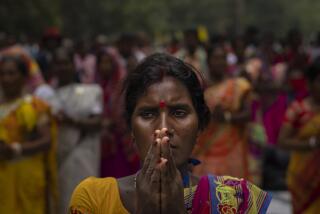Shake-Up Involves L.A. Leader : 2 Krishna Gurus Granted Leaves Amid Controversy
Two influential Hare Krishna gurus, including the Los Angeles leader, have taken leaves of absence, contributing to an ongoing shake-up in the controversial religious movement.
An official of the worldwide sect said last week that Ramesvara (Robert Grant), 35, of Los Angeles, was granted a leave in late summer to pursue possible business opportunities in the New York City area at a time when he was increasingly being accused by movement leaders of neglecting his chanting duties. The movement’s gurus are expected to chant their mantra at least two hours daily.
Ramesvara “may go ahead and step aside officially, but that is unclear,” according to Mahendra, a Krishna book publishing administrator and a close friend of the Los Angeles guru. “He wants to make a change for a number of reasons,” said Mahendra, who works in Denver but was reached by telephone in Los Angeles.
A second guru, Bhagavan, the overseer for the Krishna movement in parts of Europe, Africa and the Middle East, surprised followers recently by traveling on leave to Boulder, Colo., and telling friends that he was considering getting married.
“He’s keeping in contact with his people, but he told me he’s considering being married,” said Anuttama, president of the Denver temple.
Bhagavan, like Ramesvara, had taken vows of celibacy and both gurus are expected to follow demanding religious regimens. They were considered two of the most prominent of the 11 guru successors who carved out areas of dominance in 1977 upon the death of the movement’s founder, A. C. Bhaktivedanta Swami Prabhupada.
The movement, already a target of criticism for aggressively seeking donations for its religious books, suffered additional public image problems when two of 11 gurus were deposed after they ran into difficulties with the law.
This fall, the Krishna showcase commune in West Virginia, led by Kirtananda Swami Bhaktipada, another of the original 11, came under a federal grand jury investigation in connection with allegations of drug dealing and possible complicity in events leading to the May 22 murder in Los Angeles of Krishna dissident Steve Bryant.
In addition, an Australian guru who has admitted to homosexual activities, is resisting efforts by the organization’s Governing Body Commission to have him step down, according to a Southern California public affairs spokesman for the movement, which is formally known as the International Society for Krishna Consciousness (ISKCON).
“We have only three or four leaders (of the original 11) who haven’t had their reputations questioned,” lamented the spokesman.
“The movement is kind of without a leader now,” said the spokesman, who spoke on the condition of anonymity. The question of authority has been complicated by growing numbers of spiritual leaders claiming to be gurus, now said to be nearly three dozen.
Ramesvara’s spiritual responsibilities, which included guiding about 300 people living in the West Los Angeles temple area and others in Japan and various sections of the United States, have been transferred to committees and boards of the organization, officials said.
Ramesvara’s duties with the Bhaktivedanta Book Trust Co. in Los Angeles had already been largely assumed by trustees of the publishing house, Mahendra said.
Mahendra, the Denver publishing administrator, said the North American members of the Governing Body Commission, meeting in San Diego, were going to ask Ramesvara to take a leave if he had not requested it himself. The organization’s leaders made no announcement of the changes, however.
Mahendra and the public affairs spokesman said in separate interviews that although Ramesvara had been frequently criticized for being seen in public with a 15-year-old girl, the guru was not being pressured to step aside for that reason.
Ramesvara told a Times reporter early this summer that he had only a supportive interest in the girl and other youths whose parents are associated with the temple.
“People talked about that, because he is in the renounced life . . . and should not be involved with the children at all,” Mahendra said. “He decided that he couldn’t function in our traditional understanding of the renunciative role--he wanted to help with kids and help with business and be busy all the time. His chanting (practice) was in question for many years.”
Mahendra said that Bhagavan, whose primary base was in southern Europe, may have felt the press of administrative duties on three continents and the responsibility for several hundred disciples.
“It got too hot in the kitchen, so he got out,” Mahendra said. He did not elaborate except to say that Bhagavan “had significantly faltered and he is trying to do what he can to keep himself in a spiritual position.”
More to Read
Sign up for Essential California
The most important California stories and recommendations in your inbox every morning.
You may occasionally receive promotional content from the Los Angeles Times.








